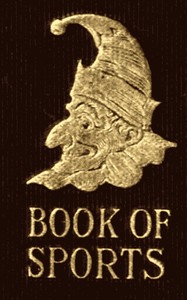Mr. Punch in Bohemia, Various [most inspirational books .TXT] 📗

- Author: Various
Book online «Mr. Punch in Bohemia, Various [most inspirational books .TXT] 📗». Author Various
Miss Sere. "Ah, Mr. Brown, if you could only paint me as I was ten years ago!"
Our Portrait Painter (heroically). "I am afraid children's portraits are not in my line."
[Pg 137]
 After the Sixth Rejection by the R.A.
After the Sixth Rejection by the R.A.
The Prodigal. "Well, dad, here I am, ready to go into the office to-morrow. I've given up my studio and put all my sketches in the fire."
Fond Father. "That's right, 'Arold. Good lad! Your 'art's in the right place, after all!"
[Pg 138]

Brown (as Hamlet) to Jones (as Charles the Second). "'Normous amount of taste displayed here to-night!"
[Pg 139]
 AN ART PATRON
AN ART PATRON
"I'll have it if you shorten the 'orizon, and make it quids instead of guineas!"
[Pg 140]
 Show Sunday.
Show Sunday.
Brown (trying to find something to admire in Smudge's painting). "By Jove, old chap, those flowers are beautifully put in!"
Smudge. "Yes; my old friend—Thingummy—'R.A.' you know, painted them in for me."
[Pg 141]
 Envy.
Envy.
Scene—Miss Semple and Dawber, standing near his picture.
Miss Semple. "Why, there's a crowd in front of Madder's picture!"
Dawber. "Someone fainted, I suppose!"
[Pg 142]
AN ARTISTIC EPISODE["Incapacity for work has come to be accepted as the hall-mark of genius.... The collector wants only the thing that is rare, and therefore the artist must make his work as rare as he can."—Daily Chronicle.]
Josephine found me stretched full length in a hammock in the garden.
"Why aren't you at work?" she asked; "not feeling seedy, I hope?"
"Never better," said I. "But I've been making myself too cheap."
"We couldn't possibly help going to the Joneses last night, dear."
"Tush," said I. "I mean there is too much of me."
"I don't quite understand," she said; "but there certainly will be if you spend your mornings lolling in that hammock."
The distortive wantonness of this remark left me cold.
"I have made up my mind," I continued, quite seriously, "to do no more work for a considerable time."
"But, my dear boy, just think——"[Pg 144]
"I'm going to make myself scarce," I insisted.
"Geoffrey!" she exclaimed, "I knew you weren't well!"
I released myself.
"Josephine," I said solemnly, "those estimable persons who collect my pictures will think nothing of them if they become too common."
"How do you know there are such persons?" she queried.
"I must decline to answer that question," I replied; "but if there are none it is because my work is not yet sufficiently rare and precious. I propose to work no more—say, for six or seven years. By that time my reputation will be made, and there will be the fiercest competition for the smallest canvas I condescend to sign."
She kissed me.
"I came out for the housekeeping-money," she remarked simply.
I went into the house to fetch the required sum, and, by some means I cannot explain, got to work again upon the latest potboiler.
Music Readily Acquired.—Stealing a march.
[Pg 143]
 The Storm Fiend
SONGS AND THEIR SINGERS
The Storm Fiend
SONGS AND THEIR SINGERS
[Pg 145]
 Such is Fame!
Such is Fame!
Duchess (with every wish to encourage conversation, to gentleman just introduced). "Your name is very familiar to me indeed for the last ten years."
Minor Poet (flattered). "Indeed, Duchess! And may I ask what it was that first attracted you?"
Duchess. "Well, I was staying with Lady Waldershaw, and she had a most indifferent cook, and whenever we found fault with any dish she always quoted you, and said that you liked it so much!"
[Pg 146]
 Domestic Bliss.
Domestic Bliss.
Wife of your Bussum. "Oh! I don't want to interrupt you, dear. I only want some money for baby's socks—and to know whether you will have the mutton cold or hashed."
In a Minor Key.Hearty Friend (meeting Operatic Composer). Hallo, old man, how are you? Haven't seen you for an age! What's your latest composition?
Impecunious Musician (gloomily). With my creditors. [Exeunt severally.
To be Sung at Concert Pitch.—"The Tar's Farewell."
[Pg 147]
 Safe.
Safe.
Guest (after a jolly evening). "Good night, ol' fellah—I'll leave my boosh oushide 'door——"
Bohemian Host. "Au' right, m' boy—(hic)—noborry'll toussh 'em—goo' light!!" [Exeunt.
[Pg 148]
CONSOLATIONS FOR THE UNHUNGNow that the painful month of suspense in Studioland is at an end, it behoves us to apply our most soothing embrocation to the wounded feelings of geniuses whose works have boomeranged their way back from Burlington House. Let them remember:
That very few people really look at the pictures in the Academy—they only go to meet their friends, or to say they have been there.
That those who do examine the works of art are wont to disparage the same by way of showing their superior smartness.
That one picture has no chance of recognition with fourteen hundred others shouting at it.
That all the best pavement-artists now give "one-man" shows. They can thus select their own "pitch," and are never ruthlessly skied.
That photography in colours is coming, and then the R.A. will have to go.
That Rembrandt, Holbein, Rubens and Vandyck were never hung at the summer exhibition.[Pg 150]
That Botticelli, Correggio and Titian managed to rub along without that privilege.
That the ten-guinea frame that was bought (or owed for) this spring will do splendidly next year for another masterpiece.
That the painter must have specimens of his best work to decorate the somewhat bare walls of his studio.
That the best test of a picture is being able to live with it—or live it down—so why send it away from its most lenient critic?
That probably the chef-d'œuvre sent in was shown to the hanging committee up-side down.
That, supposing they saw it properly, they were afraid that its success would put the Academy to the expense of having a railing placed in front.
And finally, we would remind the rejected one that, after all, his bantling has been exhibited in the R.A.—to the president and his colleagues engaged in the work of selection. Somebody at least looked at it for quite three seconds.
Art Note.—The early Italian style.—An organ-grinder at five o'clock in the morning.
[Pg 149]
 "Rest, Sir?"
"Rest, Sir?""No thanks, I can reach 'em."
[Pg 151]
 Our Flat.
Our Flat.
Extract from Lady's Correspondence. "—— In fact, our reception was a complete success. We had some excellent musicians. I daresay you will wonder where we put them, with such a crowd of people; but we managed capitally!"
[Pg 152]
 Show Sunday.
Show Sunday.
Vandyke Browne. "Peace, my dear lady, peace and refinement, those are the two essentials in an artist's surroundings." [Enter Master and Miss Browne. Tableau!
[Pg 153]
 Varnishing Day Amenities.
Varnishing Day Amenities.
Little Smudge. "Of course, I know perfectly well my style isn't quite developed yet, but I feel I am, if I might so express it, in a transition stage, don't you know," Brother Brush ("skied" this year). "Ah! I see, going from bad to worse!"
[Pg 154]
THE MIGHTY PEN["With this little instrument that rests so lightly in the hand, whole nations can be moved.... When it is poised between thumb and finger, it becomes a living thing—it moves with the pulsations of the living heart and thinking brain, and writes down, almost unconsciously, the thoughts that live—the words that burn.... It would be difficult to find a single newspaper or magazine to which we could turn for a lesson in pure and elegant English."—Miss Corelli in "Free Opinions Freely Expressed."]
O magic pen, what wonders lie
Within your little length!
Though small and paltry to the eye
You boast a giant's strength.
Between my finger and my thumb
A living creature you become,
And to the listening world you give
"The words that burn—the thoughts that live."
Oft, when the sacred fire glows hot,
Your wizard power is proved:
You write till lunch, and nations not
Infrequently are moved;
'Twixt lunch and tea perhaps you damn
For good and all, some social sham,
And by the time I pause to sup—
Behold Carnegie crumpled up!
[Pg 156]Through your unconscious eyes I see
Strange beauty, little pen!
You make life exquisite to me,
If not to other men.
You fill me with an inward joy
No outward trouble can destroy,
Not even when I struggle through
Some foolish ignorant review;
Nor when the press bad grammar scrawls
In wild uncultured haste,
And which intolerably galls
One's literary taste.
What are the editors about,
Whom one would think would edit out
The shocking English and the style
Which every page and line defile?
There is, alas! no magazine,
No paper that one knows
To which a man could turn for clean
And graceful English prose;
Not even, O my pen, though you
Yourself may write for one or two,
And lend to them a style, a tone,
A grammar that is all your own.
I see the shadows of decay
On all sides darkly loom;
Massage and manicure hold sway,
Cosmetics fairly boom;
Old dowagers and budding maids
Alike affect complexion-aids,
While middle age with anxious care
Dyes to restore its dwindling hair.
[Pg 158]The time is out of joint, but still
I am not hopeless quite
So long as you exist, my quill,
Once more to set it right.
Woman will cease from rouge, I think,
Man pour his hair-wash down the sink,
If you will yet consent to give
"The words that burn—the thoughts that live."
A HINT FOR THE PUBLISHERS.As the publishing season will soon be in full play—which means that there will be plenty of work—we suggest the following as titles of books, to succeed the publication of "People I have Met," by an American:—
People I have taken into Custody, by a Policeman.
People that have Met me Half-way, by an Insolvent.
People I have Splashed, by a Scavenger.
People I have Done, by a Jew Bill-discounter.
People I have Abused, by a 'Bus Conductor.
People I have Run Over, by a Butcher's Boy.
People I have Run Against, by a Sweep.
A Roaring Trade.—Keeping a menagerie.
[Pg 155]
 Compliments one might Improve on.
Compliments one might Improve on.
Mrs. Mudge. "I do admire the women you draw, Mr. Penink. They're so beautiful and so refined! Tell me, who is your model?" [Mrs. Mudge rises in Mrs. Penink's opinion.]
Penink. "Oh, my wife always sits for me!"
Mrs. Mudge (with great surprise). "You don't say so! Well, I think you're one of the cleverest men I know!" [Mrs. Penink's opinion of Mrs. Mudge falls below zero.
[Pg 157]
 "The Green-eyed Monster."
"The Green-eyed Monster."
George (Itinerant Punch-and-Judy Showman). "I say, Bill, she do draw!"
Bill (his partner, with drum and box of puppets). "H'm—it's more than we can!"
[Pg 159]
 "Selection."
"Selection."
Brown (as he was leaving our Art Conversazione, after a rattling scramble in the cloak-room). "Confound it! Got my own hat, after all!"
[Pg 160]

Eccentric Old Gent (whose pet aversion is a dirty child). "Go away, you dirty girl, and wash your face!"
Indignant Youngster. "You go 'ome, you dirty old man, and do yer 'air!"
Musical Fact.—People are apt to complain of the vile tunes that are played about the streets by grinding organs, and yet they may all be said to be the music of Handle.
[Pg 161]
 IS THERE ROOM FOR MARY THERE?
SONGS AND THEIR SINGERS
IS THERE ROOM FOR MARY THERE?
SONGS AND THEIR SINGERS
[Pg 162]

Photographer. "I think this is an excellent portrait of your wife."
Mr. Smallweed. "I don't know—sort of repose about the mouth that somehow doesn't seem right."
[Pg 163]





Comments (0)